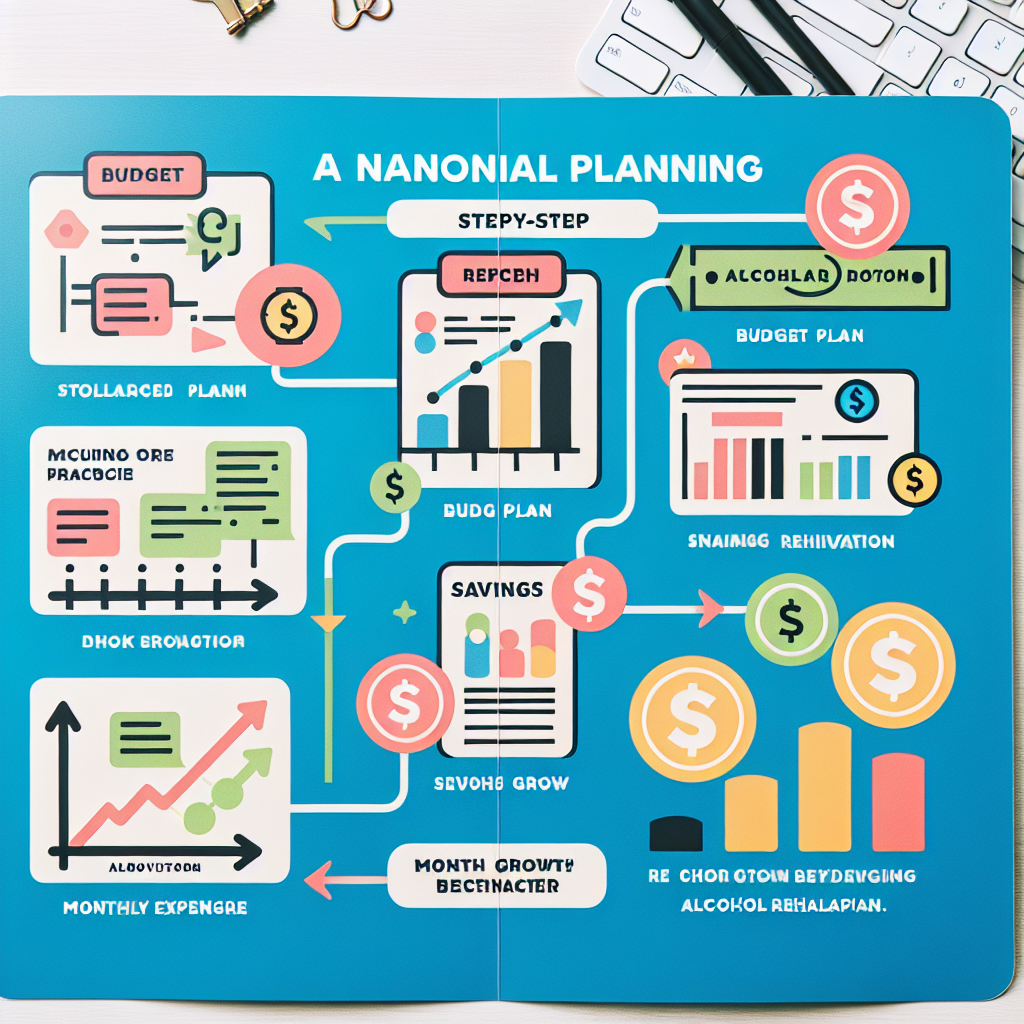-
Table of Contents

“Rebuild Your Future: Smart Financial Planning After Alcohol Rehab”
Introduction
Financial planning is a crucial step for individuals transitioning from alcohol rehab to a stable and fulfilling life. After completing a rehabilitation program, it is essential to establish a solid financial foundation to support long-term recovery and personal growth. This introduction will explore key financial planning tips tailored for those who have recently completed alcohol rehab, focusing on budgeting, managing debt, building savings, and setting achievable financial goals. By implementing these strategies, individuals can regain control over their finances, reduce stress, and create a secure future.
Building a Budget: Financial Planning Tips for Life After Alcohol Rehab
Emerging from alcohol rehab is a significant milestone, marking the beginning of a new chapter filled with opportunities for growth and renewal. One of the critical aspects of this fresh start is financial planning, which can provide a stable foundation for your recovery journey. Building a budget is an essential step in this process, as it helps you manage your finances effectively and ensures that you can meet your needs while working towards your long-term goals.
To begin with, it is crucial to assess your current financial situation. This involves taking stock of your income, expenses, debts, and savings. By understanding where you stand financially, you can create a realistic budget that aligns with your new lifestyle. Start by listing all sources of income, including wages, benefits, and any other financial support you may receive. Next, categorize your expenses into essential and non-essential items. Essential expenses include rent or mortgage payments, utilities, groceries, transportation, and healthcare costs. Non-essential expenses, on the other hand, encompass discretionary spending such as dining out, entertainment, and hobbies.
Once you have a clear picture of your financial landscape, it is time to set financial goals. These goals should be specific, measurable, achievable, relevant, and time-bound (SMART). For instance, you might aim to save a certain amount of money each month, pay off a particular debt within a specified period, or build an emergency fund. Having clear goals will not only provide direction but also motivate you to stay on track with your budget.
Creating a budget involves allocating your income to cover your expenses while working towards your financial goals. One effective method is the 50/30/20 rule, which suggests dividing your income into three categories: 50% for essential expenses, 30% for discretionary spending, and 20% for savings and debt repayment. This approach ensures that you prioritize your needs while still allowing room for enjoyment and future planning.
As you implement your budget, it is essential to monitor your spending regularly. Keeping track of your expenses can help you identify areas where you may be overspending and make necessary adjustments. There are various tools available, such as budgeting apps and spreadsheets, that can simplify this process and provide valuable insights into your financial habits.
In addition to budgeting, it is important to build an emergency fund. This fund acts as a financial safety net, providing you with a cushion in case of unexpected expenses or income disruptions. Aim to save at least three to six months’ worth of living expenses in your emergency fund. Start small if necessary, and gradually increase your savings over time.
Another crucial aspect of financial planning is managing debt. If you have outstanding debts, prioritize paying them off systematically. Focus on high-interest debts first, as they can quickly accumulate and become overwhelming. Consider consolidating your debts or negotiating with creditors for more favorable terms if needed. By reducing your debt burden, you can free up more resources to allocate towards your financial goals.
Lastly, do not hesitate to seek professional advice if you need assistance with your financial planning. Financial advisors and counselors can provide personalized guidance and help you develop a comprehensive plan tailored to your unique circumstances. They can also offer support and encouragement as you navigate the challenges of managing your finances post-rehab.
In conclusion, building a budget and engaging in thoughtful financial planning are vital steps in creating a stable and fulfilling life after alcohol rehab. By assessing your financial situation, setting clear goals, monitoring your spending, building an emergency fund, and managing debt, you can lay the groundwork for a secure and prosperous future. Remember, the journey to financial stability is a marathon, not a sprint, and every small step you take brings you closer to achieving your dreams.
Rebuilding Your Finances: Essential Steps for Post-Rehab Financial Stability
Emerging from alcohol rehab is a significant milestone, marking the beginning of a new chapter filled with opportunities for personal growth and stability. One crucial aspect of this journey is rebuilding your finances, which can often be a source of stress and uncertainty. However, with careful planning and a proactive approach, you can achieve financial stability and create a secure future for yourself.
First and foremost, it is essential to assess your current financial situation. This involves taking a comprehensive look at your income, expenses, debts, and savings. By understanding where you stand financially, you can identify areas that need immediate attention and develop a realistic plan to address them. Creating a detailed budget is a practical step in this process. A budget helps you track your spending, prioritize essential expenses, and allocate funds towards debt repayment and savings.
Transitioning from rehab to everyday life can be challenging, and it is important to set achievable financial goals. Start with short-term objectives, such as paying off high-interest debts or building an emergency fund. These goals provide a sense of accomplishment and motivate you to stay on track. As you gain confidence and financial stability, you can gradually work towards long-term goals, such as saving for a home or retirement.
Another critical aspect of post-rehab financial planning is managing debt. If you have accumulated debts during your struggle with alcohol addiction, it is crucial to address them systematically. Consider reaching out to a financial advisor or credit counselor who can help you develop a debt repayment plan. They can negotiate with creditors on your behalf, potentially reducing interest rates or arranging more manageable payment terms. Additionally, consolidating multiple debts into a single loan with a lower interest rate can simplify your repayment process and save you money in the long run.
While managing debt is important, it is equally vital to focus on building savings. An emergency fund acts as a financial safety net, providing you with a cushion in case of unexpected expenses or income disruptions. Aim to save at least three to six months’ worth of living expenses in a separate, easily accessible account. Automating your savings by setting up regular transfers from your checking account to your savings account can help you stay consistent and disciplined.
In addition to budgeting, debt management, and savings, it is essential to rebuild your credit score. A good credit score opens doors to better financial opportunities, such as lower interest rates on loans and credit cards. Start by paying your bills on time, as timely payments have a significant impact on your credit score. If you have existing credit card debt, focus on paying it down while avoiding new debt. Over time, responsible credit behavior will improve your credit score and enhance your financial standing.
Furthermore, consider seeking employment or exploring new career opportunities. Stable employment not only provides a steady income but also instills a sense of purpose and routine. If you are currently unemployed or underemployed, take advantage of job placement services, vocational training programs, or educational opportunities that can enhance your skills and increase your employability.
Lastly, remember that rebuilding your finances is a journey that requires patience and perseverance. Celebrate your progress, no matter how small, and stay committed to your financial goals. Surround yourself with a supportive network of family, friends, or support groups who can offer encouragement and guidance along the way. By taking these essential steps and maintaining a positive mindset, you can achieve post-rehab financial stability and create a brighter, more secure future for yourself.
Q&A
1. **Question:** What is a crucial first step in financial planning after completing alcohol rehab?
**Answer:** A crucial first step is to create a detailed budget that outlines all sources of income and expenses, helping to manage finances effectively and avoid unnecessary spending.
2. **Question:** How can one build an emergency fund after alcohol rehab?
**Answer:** One can build an emergency fund by setting aside a small, manageable portion of their income regularly, aiming to save at least three to six months’ worth of living expenses to cover unexpected costs.
Conclusion
Financial planning after alcohol rehab is crucial for long-term recovery and stability. Key tips include creating a realistic budget to manage expenses, prioritizing debt repayment, and building an emergency fund. It’s also important to set financial goals, seek professional advice, and avoid high-risk financial behaviors. By taking these steps, individuals can achieve financial security and support their ongoing recovery journey.



